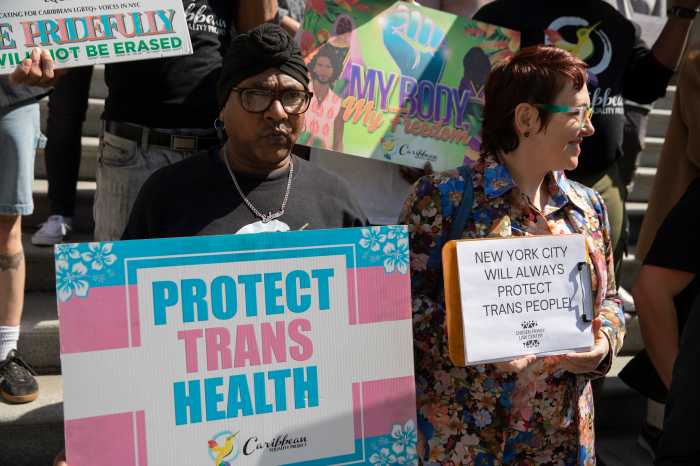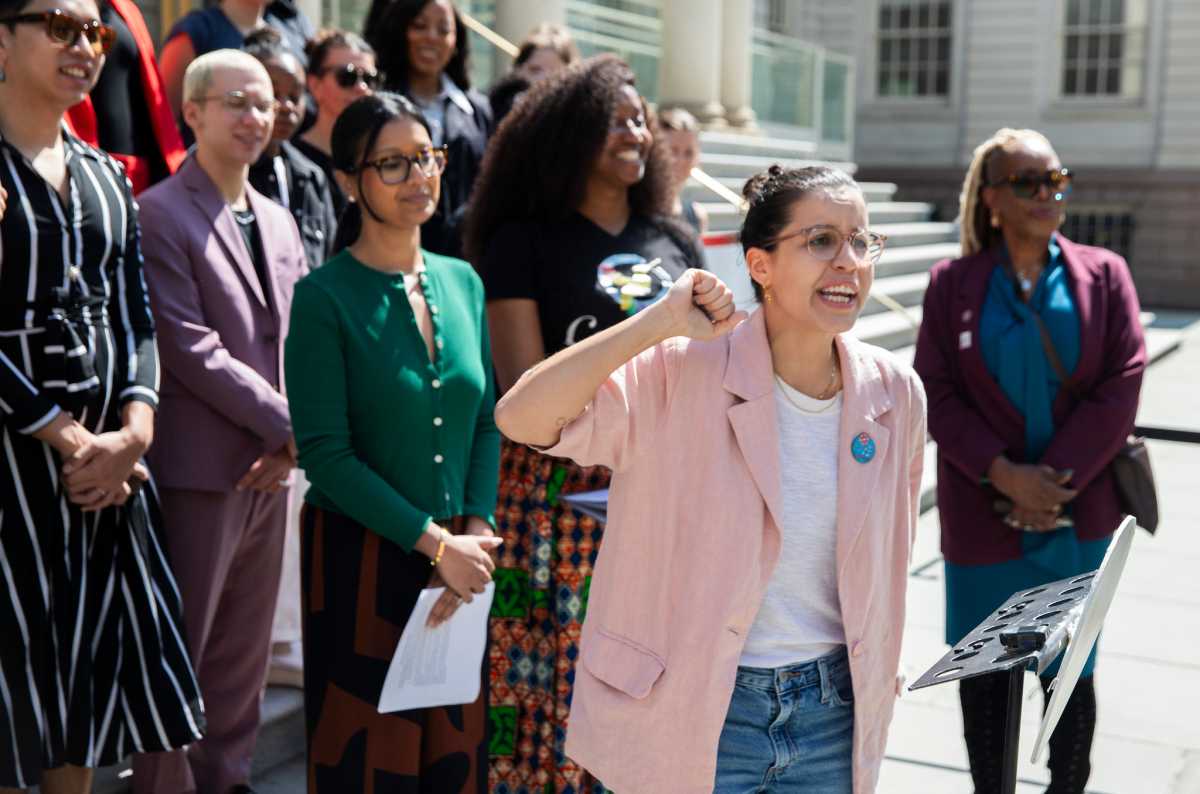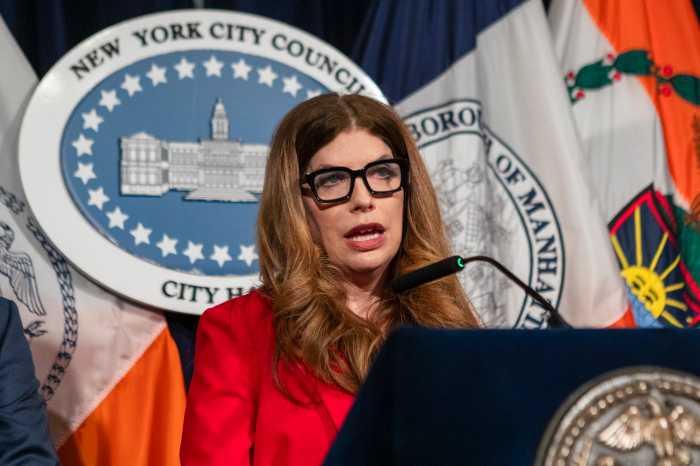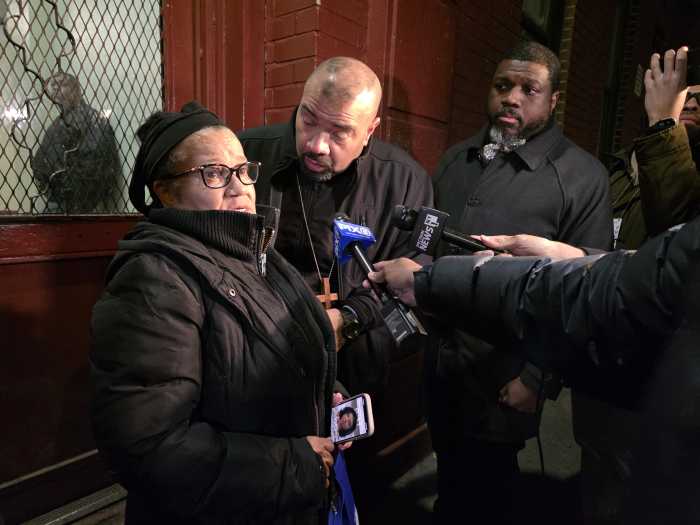The City Council on Thursday approved a broad legislative package aimed at strengthening civil rights protections and healthcare access for transgender, gender non-conforming, non-binary, and intersex (TGNCNBI) individuals, marking one of the most comprehensive local efforts in the nation to safeguard gender-diverse communities.
The slate of bills comes in response to several federal rollbacks by President Donald Trump’s administration. It also bolsters city infrastructure and support systems for TGNCNBI New Yorkers and visitors.
Some of the actions taken by the Trump administration so far threatening transgender rights have included attempts to axe gender-affirming medical care, removing references to transgender people from federal websites and databases, banning transgender people from serving in the military, and terminating diversity, equity, and inclusion programs.
Queens Council Member Tiffany Cabán, sponsor of one of the key measures, Introduction 1200-A, said the legislation “ensures people’s gender identities are seen, are affirmed, and marked in our city records.”
The bill mandates that the Mayor’s Office of Equity and Racial Justice provide public guidance on legal protections, hate crime resources, gender-affirming care, and legal name and gender marker changes. A citywide media campaign and a formal outreach report are also required.
On the steps of City Hall Thursday morning, Cabán criticized hospitals like NYU Langone and Mount Sinai for previously halting youth gender-affirming care for children in line with Trump’s executive order, asserting, “I want to make it clear that here in New York City and New York state, it is the law to provide gender affirming care. An executive order does not supersede our city and state laws.”
Introduction 1201-A, sponsored by Brooklyn Council Member Shahana Hanif, expands the city’s private right of legal action to include interference with gender-affirming care. The “Affirm Act” allows anyone traveling to New York for care to counter lawsuits from states with anti-trans policies.
“This bill will give our trans and gender non-conforming communities the legal power against those who attempt to criminalize or punish their care,” said Hanif. “New York City is and must remain a safe harbor, a place of protection, dignity, and access for all who seek gender care in our five boroughs.”
Other measures include Introduction 246-A by Brooklyn Council Member Crystal Hudson, which mandates an “X” gender marker option on city forms, and Introduction 1203-A by Council Member Chi Ossé, requiring a city assessment of services for newly arrived TGNCNBI migrants. Ossé also sponsored Introduction 1204-A, ordering a Department of Health study on health inequities facing TGNCNBI and intersex individuals, with a health agenda due by 2028.

The legislation builds on the 2024 passage of New York State’s Equal Rights Amendment, which added gender identity and other categories to the state constitution’s list of protected classes.
“This is the strongest package of trans safety bills passed in the country so far,” said Diana Adams, executive director of the Chosen Family Law Center, which consulted on the legislation.
In addition to the bills, the Council passed several resolutions urging state-level action. These include calls for stronger protections for personal health data and stricter requirements for hospitals to follow trans health care standards.
Resolution 771, introduced by Manhattan Council Member Erik Bottcher, supports a state bill that would enhance protections for personal health data. Resolution 774, from Council Member Hudson, calls on the New York State Department of Health to require hospitals to follow the World Professional Association for Transgender Health’s Standards of Care.
Queens Council Member Lynn Schulman sponsored both Resolution 781, which seeks to limit out-of-state access to New York’s Prescription Monitoring Program data for specific medications, and Resolution 793, which backs a bill to allow patients to restrict disclosures of sensitive health information related to abortion and gender-affirming care.
“We want to make sure that people don’t have any of that sensitive data… misused against them,” Adams said, emphasizing the broader democratic stakes: “Cities and states can set their own family policy, health policies, and human rights policies.”
While celebrating the passage of the legislation Thursday morning, Kei Williams, executive director of the New Pride Agenda, said that to meet the urgency of the moment, the City must strengthen investment in trans healthcare, housing, and employment.
“Across the country, a tidal wave of anti-trans legislation is crashing down, targeting trans youth, criminalizing gender affirming care and threatening providers with legal action,” said Williams. “These aren’t just policy debates. They are direct attacks on our safety, on our health, and on our right to exist. While extremists try to legislate us out of public life, New York must do the opposite. New York must protect. We must invest and we must lead.”






































